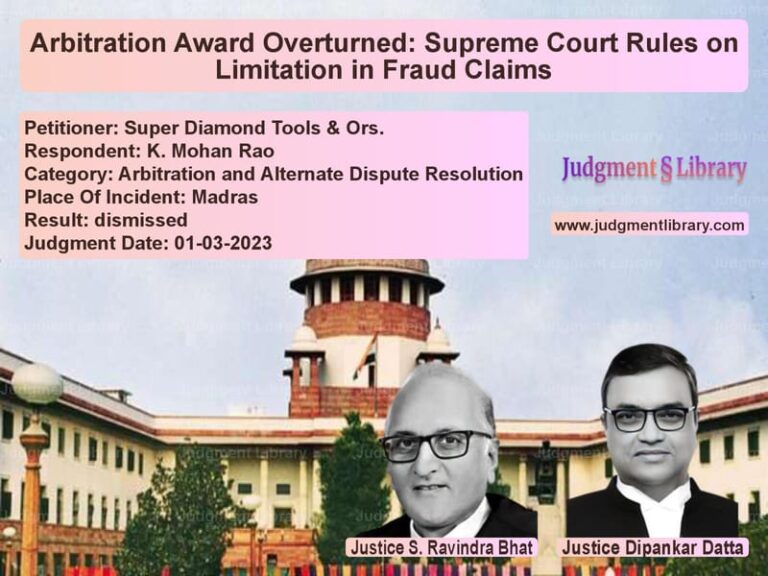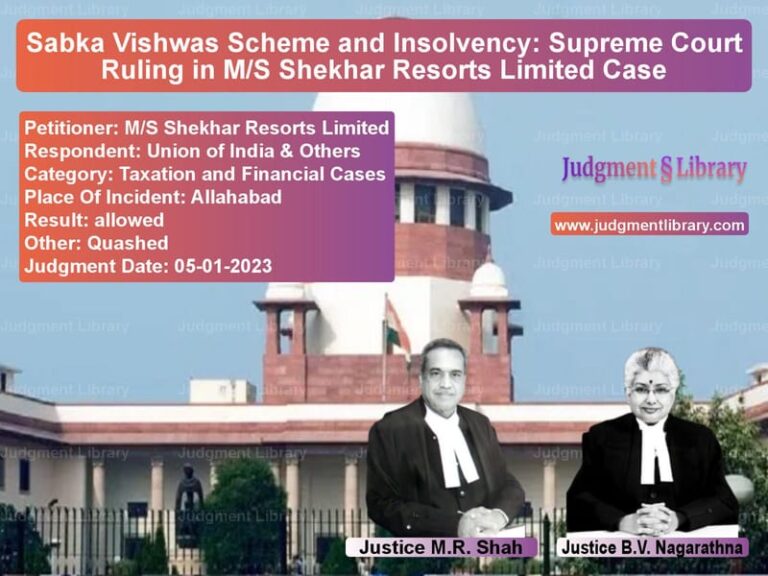Supreme Court Upholds Wage Compensation for Additional Work in Food Corporation of India Case
The Supreme Court of India recently ruled in J. Linet vs. The Assistant Manager (Depot), Food Corporation of India & Others, addressing the claim of an employee who sought additional compensation for work performed beyond her regular duties. The Court directed the respondents to pay the difference in wages for two and a half years, reinforcing the principle of fair remuneration for extra work.
Background of the Case
The appellant, J. Linet, was employed as a casual worker at the Food Corporation of India (FCI). Over a period of two and a half years, she was assigned additional duties as a Messenger while continuing her regular work. However, despite performing extra work, she was not provided additional remuneration. Linet filed a petition seeking compensation for the additional workload.
The case was initially heard by the High Court, which ruled in favor of the appellant, stating that she was indeed entitled to extra payment for the additional work performed. However, the respondents refused to comply with the ruling, prompting Linet to approach the Supreme Court for relief.
Petitioner’s Arguments
The appellant, J. Linet, contended the following:
- She was assigned extra duties as a Messenger while continuing her regular responsibilities.
- The work of a Messenger was beyond the scope of her initial job role, requiring additional effort and responsibility.
- The respondents failed to compensate her for the additional work despite clear evidence of her extra duties.
- The High Court had already recognized her right to additional payment, and the respondents’ refusal to comply was unjust.
Respondents’ Arguments
The Food Corporation of India defended its position with the following arguments:
- The appellant was employed as a casual worker and had no contractual right to additional remuneration.
- Her assignment as a Messenger was a temporary arrangement that did not warrant extra payment.
- The organization had already considered her case and issued a speaking order rejecting her claim.
- The decision of the High Court did not establish a binding precedent that required additional payment.
Supreme Court’s Judgment
Recognition of Additional Work
The Supreme Court examined the evidence and affirmed that the appellant had indeed performed additional duties as a Messenger. The Court observed:
“The appellant is justified in contending that she is entitled to additional payment on the strength of Exhibit P2 order whereby she had been allotted additional duty in an office as a Messenger in addition to her normal work.”
Binding Nature of High Court Ruling
The Court noted that the High Court had already recognized the appellant’s claim, making it binding on the respondents. The judgment stated:
“The finding of the High Court as against the respondents has become final.”
Direction for Wage Compensation
The Supreme Court directed the respondents to calculate and disburse the difference in wages for the two-and-a-half-year period during which the appellant worked as a Messenger. The ruling explicitly stated:
“The respondents shall disburse the difference in wages for the period of two and a half years in the post of Messenger after adjusting the emoluments already granted to her while working as a casual worker.”
The Court mandated that the payment be made within two months.
Key Takeaways from the Judgment
- Fair Compensation for Extra Work: The ruling reinforces that employees are entitled to additional payment when assigned duties beyond their regular scope of work.
- Employers Must Comply with Judicial Rulings: The judgment highlights that once a court has ruled in favor of an employee, employers must comply rather than delay compensation.
- Casual Workers Also Have Rights: Even though the appellant was a casual worker, the Court affirmed that she was still entitled to fair wages for additional duties.
- Judicial Oversight in Employment Disputes: The case demonstrates the role of courts in ensuring that employees are not exploited by being forced to perform extra work without fair compensation.
Conclusion
The Supreme Court’s judgment in J. Linet vs. The Assistant Manager (Depot), Food Corporation of India & Others is a significant decision that upholds labor rights and ensures fair compensation for additional work performed. By directing the respondents to compensate the appellant, the Court has reinforced the principle that no employee should be deprived of fair wages for extra duties assigned. This ruling serves as a precedent for similar cases where workers are asked to take on additional responsibilities without proper remuneration.
Petitioner Name: J. LinetRespondent Name: The Assistant Manager (Depot), Food Corporation of India & OthersJudgment By: Justice Kurian Joseph, Justice Mohan M. ShantanagoudarJudgment Date: 08-02-2018
Don’t miss out on the full details! Download the complete judgment in PDF format below and gain valuable insights instantly!
Download Judgment: J. Linet vs The Assistant Manage Supreme Court of India Judgment Dated 08-02-2018.pdf
Direct Downlaod Judgment: Direct downlaod this Judgment
See all petitions in Employment Disputes
See all petitions in Public Sector Employees
See all petitions in Pension and Gratuity
See all petitions in Judgment by Kurian Joseph
See all petitions in Judgment by Mohan M. Shantanagoudar
See all petitions in allowed
See all petitions in supreme court of India judgments February 2018
See all petitions in 2018 judgments
See all posts in Service Matters Category
See all allowed petitions in Service Matters Category
See all Dismissed petitions in Service Matters Category
See all partially allowed petitions in Service Matters Category







